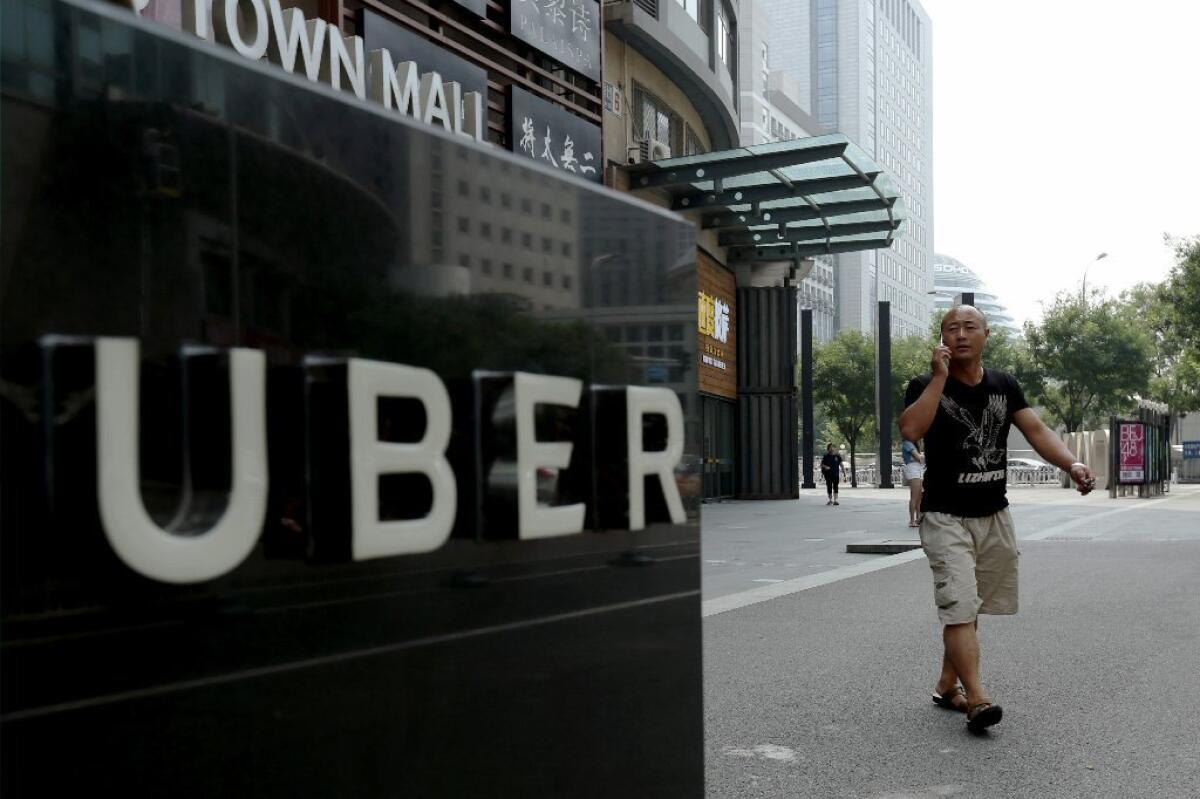Why U.S. tech companies can’t figure out China

Uber’s abrupt decision to sell its China operations to chief rival Didi Chuxing on Monday adds to a growing list of U.S. technology firms that have failed to flourish in the world’s second largest economy.
The list, which reads like a corporate all-star team, includes Google, EBay, Amazon and Facebook. Each company set out to seize on China’s breathtaking size and potential. Each has been disappointed.
What makes China such a challenging market for so many American tech stalwarts? For one, it operates like an alternate Internet universe with established homegrown versions of Google (Baidu), Twitter (Sina Weibo) and YouTube (Youku Tudou).
Many Chinese firms can innovate safe in the knowledge they don’t have to face foreign competition thanks to government bans on popular platforms such as Twitter, Facebook and YouTube.
For the foreign companies that do make it in, they are often pitted against local companies as the non-Chinese option — no small detail against a backdrop of heightening nationalism. Just last month, Chinese Internet users were posting pictures of their smashed iPhones to protest Washington’s objections to Beijing’s territorial claims in the South China Sea. And that was for Apple, considered the most successful foreign tech brand in China.
“There’s a home-field advantage,” said Arthur Dong, a professor at Georgetown’s McDonough School of Business. “Whether it’s state function of government policy or a less formal policy, foreign companies are at a great disadvantage.”
That’s in line with Beijing’s desire to cultivate so-called national champions, large domestic companies hoped to one day become China’s most recognizable multi-national brands.
The goal is to wean the country’s now slowing economy off exports and infrastructure investment and ensure that the most lucrative opportunities go to Chinese firms.
“Since President Xi Jinping took office, they have increasingly switched from an economic strategy that emphasizes attracting foreign direct investment to one that favors indigenous innovation and Chinese-owned firms,” said Robert Atkinson, president of the Information Technology and Innovation Foundation.
One of the easier places to do this is on the Internet, Atkinson said, because it doesn’t require the cutting edge technology or know-how of, say, the aerospace or automotive sectors.
See the most-read stories in Business this hour >>
And China’s Internet market is so big that it offers an ideal environment for massive Chinese firms like Tencent, owner of WeChat, to establish itself before going global. At 668 million, the number of Internet users in China outnumbers the U.S. population by 2-to-1 -- with still plenty more room to grow.
That size, experts say, means it’s very difficult for a foreign firm to come in and dominate. Take Groupon, the group buying e-commerce site, which launched in China to great fanfare in 2011 only to discover it was up against 200 clones of its service. Within months, Groupon shuttered offices in China.
The case underscores how often American companies are unprepared for the differences in China. EBay, for example, was undone by Alibaba’s Taobao, which offered free listings and appealed to Chinese users with little details like naming moderators after characters from famous kung fu novels. The lesson: a premium service doesn’t always make sense in an emerging market.
For Uber, the challenge was keeping up with a bigger and scrappier competitor in Didi. The San Francisco ride-hailing giant was losing $1 billion a year fighting a local rival that served more cities and was agnostic about what set of wheels its drivers chose to use, be it a taxi, a car or a bus.
The battle wasn’t going to get easier for Uber, which was the second most popular ride-hailing service in China with about 8% market share compared with Didi’s 85%.
That’s because in making ride-hailing legal last week, the Chinese government also stipulated an end to subsidies that made rides artificially cheap for the sake of grabbing more customers. Without subsidies, Uber’s chances of unseating Didi’s dominance were daunting at best.
“I don’t know if that’s clear evidence the government has its thumb on the scale again, but you’ve got to think it hurts Uber more than it does Didi,” said Atkinson of the Information Technology and Innovation Foundation.
The odds were also stacked against Google after it ran afoul of the Chinese government and pulled-out its China operations in 2010. The search giant said it left because of censorship and because it was the target of cyberattacks in the country.
But analysts say Google didn’t just lose to Baidu because of government meddling. The American tech company could never overcome the perception that Baidu was made for a Chinese audience and Google for a foreign one.
It took years for Google to realize that many Chinese couldn’t pronounce its name. The company ultimately had to rebrand itself GuGe in China. Even then, many people still chose to call it GoGo.
Given the abject failures of most U.S. tech companies in China, Uber’s deal with Didi doesn’t look bad to some observers. Uber, after all, isn’t leaving China, and it still has a sizable stake in the growing ride-hailing space — not that the bar was particularly high. Microsoft, for instance, isn’t giving-up on China even though an estimated 95% of its copies of Microsoft Office in the country were pirated at one point.
“They’re the first international Internet company that didn’t lose,” William Bao Bean, a Shanghai-based partner at SOS Ventures and the managing director of Chinaccelerator, said of Uber. “They fought to a draw. And for an American Internet company, that’s as good as a win.”
Twitter: @dhpierson
Times staff writer Tracey Lien contributed to this report.
MORE FROM BUSINESS
German company plugs into L.A. area for its electricity storage operation
Closing the Bank of Mom and Dad
Looking for work? Airlines will need 617,000 pilots over next 20 years







